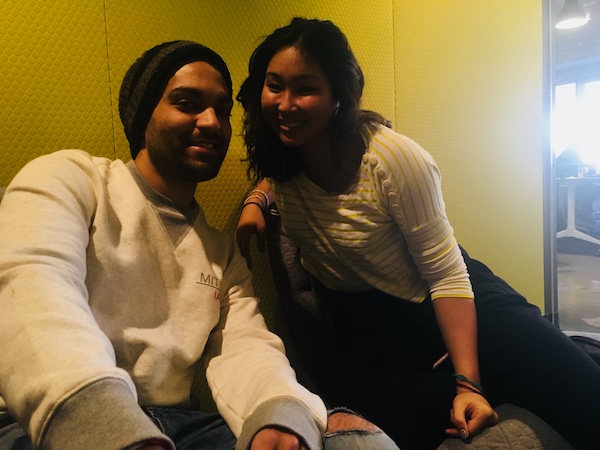Author: Martin Trust Center
MIT’s Storyteller In Residence, Dom Smith talks to best friends, and start-up partners AJ and Kat about being in business together as part of MIT fuse, and discusses what it takes for a friendship to survive in that context, as well as their respective attitudes with regards to problem solving.

Can you introduce yourselves, and tell me a little bit about what you do here?
K] My name is Kat, and I am a first year MBA student, and I am the link here because AJ is a friend of mine from back in London, and we went to university together. We both came together to run a start-up, and to see where our ideas can take us.
AJ] I’m from London, and I’m not a student from MIT, but I am a good friend of Kat’s, and the reason I am here, is that we are part of this accelerator program called MIT fuse, and a little bit before Kat came out to the US to start her MBA, we hit upon this idea for a start-up, that we were developing long-distance. We applied for this accelerator program, we got on, and I came out here!
AJ] We got a few sources of funding that also helped, that also helped!
Can you tell me about the problems you are tackling together?
K] AJ and I come from a classical music background, and we met at music school back in the UK. We are both classically trained musicians who went into music performance. Our background comes from this very rigorous tradition. What brought us together, actually, is that we are both extremely into action sports. That’s doesn’t happen often – people that like action sports, and classical music. We became friends because of that overlap, and we taught each other our various sports. Essentially when we were on the train back in London to go and ride together, we would talk about our business ideas, and the problems that we see in this industry.
AJ] The problem that we could see, coming from this very rigorous, structured classical music background, is that our board sports are so damn hard to learn. The training structures that are there are a little disparate, and can be conflicting. It’s very difficult to learn those types of sports. What’s interesting is that we understand that learning board sports can have a real value; in that there’s a lot of self-confidence that learning a difficult skill can bring – it doesn’t really matter if that’s a board sport, or piano or the violin. It’s all about having the self-discipline to learn a difficult skill, and that’s something that we really want to share.
K] It’s easy for us to learn new skills, because we understand the process, because we understand how to learn something. For us it’s always been about instilling that confidence and helping other people to push past their mental barriers, in order to do things that they didn’t think would be possible. That’s what classical music training taught me. It gave me the confidence to tackle any sort of challenge. If you’re patient, and disciplined and analyze things in the right way, then you can pretty much conquer anything that you want to do. We want to teach people how to learn sports.
So, you’re trying to teach people to adopt a similar approach?
Exactly. There are various ways for people to achieve that; you could either be bringing people together on a mountain, or bringing people together geographically, and matching their abilities – or in a coaching type of environment. It could also be to create a kind of social media platform, or a network where people can help each other learn. There are several solutions that we are thinking about, and are possible [for us in the future].
What advice would you give someone looking to develop their idea?
AJ] I think that the first thing you have to do is actually start! When having that sensation of staring up a mountain, looking up to the top and thinking, ‘Oh my god, that is so far away’ – of course, it’s so much easier to just look away. So, actually starting something is the biggest hurdle.
K] What I’ve learned during this process is that, you have to find the idea and an industry that you are really passionate about, because as soon as you divert into something you are less passionate about, the motivation decreases.
AJ] You have to find a problem that you are passionate about solving. If you are passionate about solving this problem, then the ideas you have will flow. If you are married to a particular business model, that’s great, but it can be challenging if you come up against a barrier. It can be difficult to maintain creativity.
K] Essentially, you have to be flexible and open-minded enough to keep that motivation going. There’s a saying that you have to pick two people really carefully in your life – the first is the person that you want to marry, and the second is your business partner, and I can’t emphasize that enough. The thing that’s unique between me and AJ is that we are not only best friends, and have the same hobbies, but we worked together in the same consulting firm prior to coming here. We have got previous experience of each other in a business environment, and we know how each other works. We can always be really honest with each other. One thing you can’t afford to lose is time, because time is money. So, if an idea is not working the best thing you can do is cut it off.


Follow